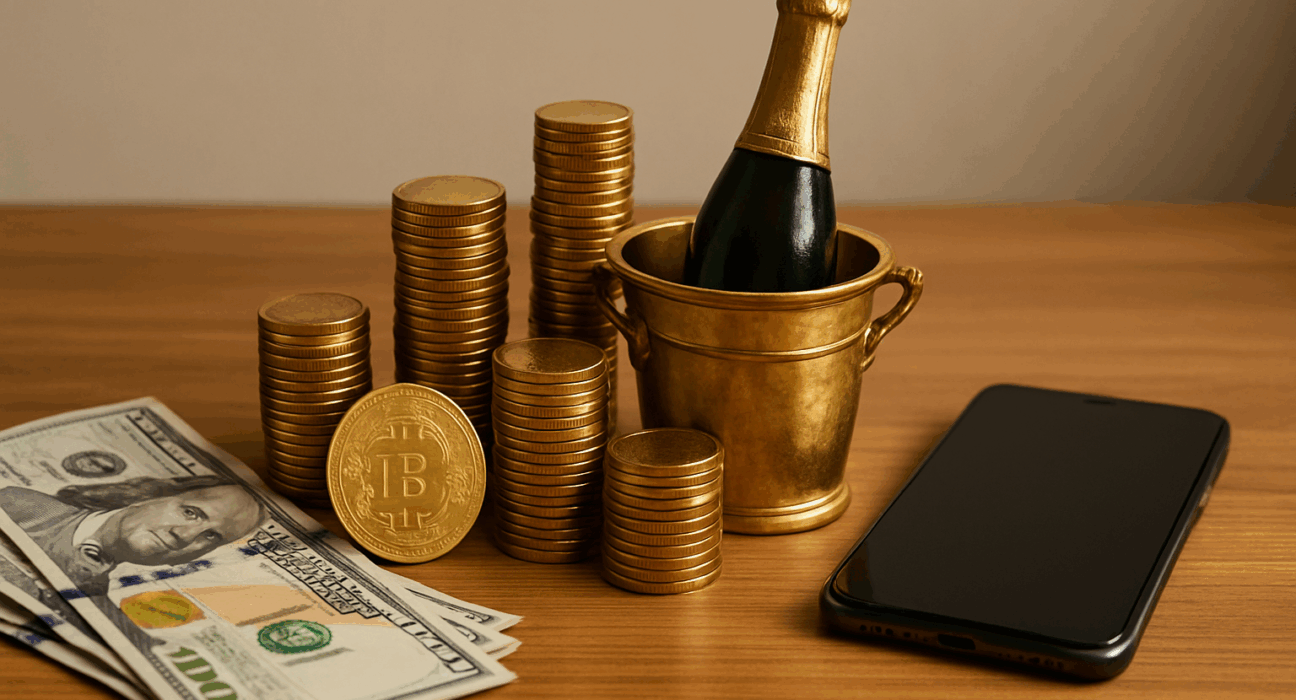Most millionaires slog through day jobs or launch serious startups – but not these folks. Over the last 10–20 years, a lucky (or crazy) few have cashed in via methods so bizarre they sound made up. We’re talking accidental windfalls and weird ideas that turned into fat bank accounts, all with a straight face. From selling pixels or pet farts to riding meme stocks to the moon, here are some of the craziest true stories of people who got rich in delightfully absurd ways. Grab some popcorn (and maybe a calculator) as we dive into these humorous tales of unconventional riches.
1. The Student Who Sold Pixels for Millions
In 2005, 21-year-old Alex Tew was a broke college student worried about tuition debt. His solution? Create a website with one million blank pixels and sell each pixel for $1. It sounded ridiculous – who pays for a single pixel? – but the idea was quirky enough to go viral. Tew’s “Million Dollar Homepage” turned into prime internet real estate as companies and individuals scrambled to buy tiny ad spots on his grid. Pixels sold in minimum blocks of 100 (gotta have at least a 10×10 dot worth noticing), and as media coverage snowballed, so did sales. By January 2006, the final pixels were auctioned off for a premium, bringing Alex’s total haul to $1,037,100. He literally made a million bucks by selling nothing tangible at all – just pixel-sized dreams on a webpage. The best part? Tew raised enough to pay for college and then some (in fact, he dropped out to manage his windfall). The site still stands as a monument to internet-era creativity, dotted with oddball ads – a frozen time capsule of the moment a student turned 1 megapixel into one mega fortune.
2. Dear Santa, Please Send Cash
Turns out, Santa Claus can make you rich – if you’re the one writing his mail. Back in 2001, entrepreneur Byron Reese cooked up a holly-jolly side hustle called SantaMail. The premise was simple: parents pay about $10–15, and their child receives a personalized letter “from Santa,” complete with an authentic North Pole postmark. Reese tapped into every kid’s holiday magic (and every tired parent’s willingness to pay for a Christmas miracle). Orders started pouring in. In the first year alone, Reese sent out 10,000 Santa letters – netting around $100,000. Soon, the SantaMail operation was booming like Santa’s workshop in overdrive. Over the next few years, demand exploded. By hiring “elves” (aka staff) and streamlining the process, Reese scaled up to handle tens of thousands of letters each Christmas season. Within a few Christmases, this whimsical venture was reportedly a million-dollar-a-year business. By 2025, SantaMail had mailed over 500,000 letters in total, and Byron Reese was laughing all the way to the bank (probably saying “Ho ho ho!” as he cashed checks). Who knew that playing Santa – essentially selling parents a bit of holiday sparkle – could turn into such a profitable (and legit) gig? It’s a heartwarming reminder that sometimes the “nice list” comes with a very nice income.
3. The $26 Bitcoin Bonanza
Imagine finding out that a joke investment you made years ago is now your ticket to Easy Street. That’s exactly what happened to Kristoffer Koch, an electrical engineer from Norway, in one of the greatest accidental wealth stories of the decade. In 2009, Koch spent a mere 150 Norwegian kroner (about $26) to buy some of this new “magic internet money” called Bitcoin. He was writing a thesis on encryption, thought it was an interesting experiment, and then promptly forgot about it. Fast forward to 2013: Bitcoin’s price had skyrocketed, and Koch started seeing news about it. He suddenly remembered, “Hey, I have some of those!” – after hunting down his long-lost wallet password, he discovered 5,000 BTC sitting in his account. The value? Roughly $885,000 at the time. Not a bad surprise for something he bought with pocket change! Koch cashed out a portion of his digital treasure and purchased himself a plush apartment in Oslo. His girlfriend, once skeptical about him buying “fake internet money,” had to eat her words (perhaps in a dining room bought by Bitcoin). “I thought it was Monopoly money,” Koch mused – but Monopoly money never bought anyone a real house. And Koch isn’t alone. Over the years, a number of early Bitcoin dabblers woke up to find themselves accidental millionaires as crypto prices climbed. It’s the classic “I HODL’d my way into riches” tale – though few have a story as neat (and unlikely) as turning $26 into an apartment. Talk about the ultimate forgotten savings account!
4. GameStop: When a Meme Stock Jackpot Happened
If there’s a modern fable about David vs. Goliath (with dollars), it’s the GameStop stock saga of 2021. A struggling brick-and-mortar video game retailer became the center of a frenzied financial meme stock revolt – and some everyday Joes made absurd fortunes overnight (at least on paper). It started on a Reddit forum called r/WallStreetBets, where retail traders banded together to buy GameStop (ticker: GME) and squeeze Wall Street short-sellers. The movement turned into an internet circus: memes flew, hedge funds bled, and GameStop’s share price exploded from under $20 to nearly $500 in a matter of days. Suddenly, accidental millionaires were minted among those who got in early. One famous figure, an investor known online as “Roaring Kitty” (real name Keith Gill), turned an initial $50,000 position into as much as $50 million at the peak of the frenzy. He even ended up testifying in Congress (perhaps the first time lawmakers have grilled someone who live-streamed wearing a cat-themed t-shirt). Others used their surprise gains in touching ways – paying off student loans, buying houses, or, in one Redditor’s case, paying for several Nintendo Switches to donate to children’s hospitals. Of course, fortunes swung wildly; a lot of latecomers saw losses once the bubble deflated. But for a lucky (and gutsy) few, the GameStop saga proved that a meme-fueled market gamble could literally change your life in a week. It was chaotic, a little ridiculous, and absolutely unprecedented – Wall Street won’t be forgetting the power of internet hordes anytime soon.
5. Dogecoin: From Joke Coin to Legit Millions
Not to be outdone by stocks, the crypto world served up its own cocktail of absurd riches with Dogecoin. Originally created in 2013 as a parody – yes, a joke – featuring the Shiba Inu “Doge” meme, Dogecoin was never meant to be taken seriously. Fast forward to 2021: thanks to a perfect storm of Reddit hype, Tweets from Elon Musk, and general crypto mania, Dogecoin’s price blasted off from fractions of a penny to about 70 cents at its peak. That sounds tiny, but consider that early fans were hoarding millions of Dogecoins back when it was virtually worthless. Suddenly, those modest stashes turned into life-changing money. Take the case of Glauber Contessoto, a 33-year-old who went all-in on Doge around the start of 2021. He poured his savings (about $180,000) into Dogecoin when it was around half a cent, and in roughly 69 days he was – get this – a Dogecoin millionaire. His account balance hit over $2 million as the coin’s value skyrocketed. The man was literally refreshing an app on his phone to watch his net worth climb by the hour. And he wasn’t alone; others who mined or bought Doge for fun years earlier found themselves sitting on small fortunes. Of course, in true crypto rollercoaster fashion, Dogecoin’s price later dipped and some paper gains vanished. Contessoto himself held on as his $2 million shrank back down, then bubbled up again – a hodler’s wild ride. But hey, as he would say, “Such is Doge. Much wow. Very millionaire.” The Dogecoin saga proved that in the bizarre world of cryptocurrency, even a meme-themed coin with a smiling dog can make you absurdly rich… or at least take you on one heck of a financial moonshot.
6. From Viral Fame to Fortune (Grumpy Cat’s Pay Day)
Internet fame doesn’t always last, but sometimes it can pay off big time while it does. Case in point: Grumpy Cat – the perpetually frowning feline who became a meme legend. Grumpy Cat (real name Tardar Sauce) went viral in 2012 after a photo of her adorably sour expression hit Reddit. Within days, she was the talk of the internet, spawning captions, fan pages, and merchandise demand out the wazoo. Sensing an opportunity, her owners leaned into the fame and built a veritable Grumpy empire. There were Grumpy Cat T-shirts, mugs, plush toys, a best-selling book, and even a Lifetime Channel Christmas movie (yes, Grumpy Cat’s Worst Christmas Ever was a real film). The grumpier she looked, the more people spent. In just a few years, Grumpy Cat’s brand had generated millions of dollars. While an often-cited (and sensational) figure claimed she made $100 million – the family denies it was that high – she certainly earned seven figures at least. Grumpy’s owner, Tabatha Bundesen, was able to quit her waitressing job within days of the meme taking off, thanks to appearance fees and licensing deals rolling in. Not bad for a cat that simply looked unimpressed by everything! And Grumpy’s not the only viral star who cashed in: remember “Disaster Girl” (the meme of a little girl smirking at a burning house)? In 2021, now-grown Zoe Roth sold the original meme photo as an NFT for about $500,000. Even the iconic Doge meme (the Shiba Inu image that inspired Dogecoin) sold as an NFT for roughly $4 million. It seems in today’s world, if you become a meme, you might laugh your way to the bank – or at least fund a college education or two – all for being in the right viral photo at the right time.
7. The Fart Jar Fortune (Yes, Really)
On the spectrum of strange ways to get rich, this one blasts right off the charts. Meet Stephanie Matto, a reality TV personality who found an… unconventional source of income in 2021: selling her farts in a jar. You read that correctly – she literally would fart into glass mason jars, seal them up, and mail them to paying customers. And as absurd as that sounds, people bought them. A lot of them. Matto, ever the entrepreneur, set up an assembly line of flatulence: she went on a special high-fiber diet (protein shakes and beans galore) to produce extra-potent “product,” and started shipping out jars at $1,000 a pop. Demand surged; at one point she claims she was bottling dozens of toots in a couple of days just to keep up with orders. In a short span, she raked in over $200,000 in sales. It turns out the internet truly has a marketplace for everything – even bottled body gas. Unfortunately (or perhaps fortunately for her dignity), this fairy tale of flatulence had a downwind side: Matto’s intense fart-producing diet landed her in the hospital with what she thought was a heart attack but turned out to be severe gas pains. The doctors strongly advised her to change her diet and retire from the gas game. Health scare aside, she’d already made a small fortune from this venture. She pivoted to selling fart jar NFTs (because of course that’s a thing), but the physical jars were what made headlines worldwide. If there’s a moral here, it might be: where there’s a toot, there’s loot – but maybe don’t push your luck (or your digestive system) too far.
8. The Graffiti Artist Who Took Stock – and Struck Gold
Sometimes the craziest path to riches is simply saying “yes” to an odd offer. In 2005, graffiti artist David Choe was asked to paint murals at the offices of a little startup called Facebook. The company, run by a kid named Mark Zuckerberg, couldn’t pay him his normal fee; instead, they offered stock shares as compensation. Choe actually thought Facebook’s business idea was pretty stupid at the time – but, maybe out of intuition or just for the heck of it, he took the stock instead of cash. That decision turned out to be a multi-million-dollar stroke of genius. When Facebook went public in 2012, those shares were valued at around $200 million. Yes, $200,000,000 – for some office paintings and a bit of faith in a then-unknown social network. Choe went from a starving artist (literally tagging buildings for a living) to an insanely wealthy art-world wildcard overnight. The irony? He hadn’t sought out tech riches at all; they fell into his lap because he was willing to get paid in funny money (startup equity) rather than real money. You can bet he’s glad he didn’t cash that out for a mere $60k back in the day. His story reads like a Silicon Valley fairy tale: “Once upon a time, an artist drew on a wall and received a golden ticket.” Sometimes, the lesson is take a chance on the unconventional, especially if someone offers to pay you in stock of the next big thing (and maybe double-check that the “ridiculous” startup isn’t actually destined to rule the world).
Conclusion
From pixel peddlers to meme coin millionaires, these stories prove that truth is stranger than fiction in the world of wealth. While most of us will keep grinding in ordinary ways (sadly, no billion-dollar fart market for us), it’s fun to know that out there, someone actually made a fortune by doing something completely off-the-wall. These cautionary-yet-comedic tales remind us that opportunity can knock in weird ways – sometimes it’s a joke that goes too far, a hobby that finds a niche, or a stroke of luck decades in the making. You can’t exactly plan to replicate any of these paths (and probably shouldn’t try at home), but you can get a good laugh – and maybe a spark of inspiration – from them. After all, in a world where a cat’s scowl and a video game store’s stock can lead to millions, who’s to say your own crazy idea won’t be the next absurd success? Stay savvy, stay open-minded, and you just might find riches where you least expect them.





